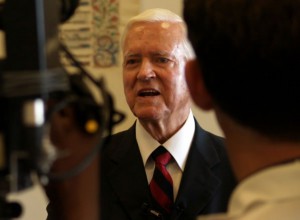
A maquiladora operation just over the border in Mexico. Photo courtesy of Wikipedia.
By Andy Brack, editor and publisher | South Carolina’s Fritz Hollings warned the nation 22 years ago. The canary in the coal mine, he cautioned Washington policymakers that the North American Free Trade Agreement was Not A Free Trade Agreement in the nation’s best interest.
![]() He predicted job losses that would force hundreds of thousands out of work, particularly in manufacturing.
He predicted job losses that would force hundreds of thousands out of work, particularly in manufacturing.
“I just think it’s bad, period, when you’re down in manufacturing,” Hollings said in a September 1993 press conference. “Thirty years ago, you had about 34 to 36 percent of your production in manufacturing. You’re down [now] to 17 percent — half. And if you can’t produce goods, you can’t be a world power.”
He was right. And today, it’s worse. By 2013, the manufacturing sector employed about 12 million workers, 8.8 percent of total U.S. employment, according to the Economic Policy Institute. After NAFTA, hundreds of thousands of Americans watched as their jobs headed to Mexico or overseas. If they got new jobs, they often earned less, some earning today about what they received 35 years ago. Today with lower wages and fewer benefits, it’s no coincidence that growing income inequality is a presidential campaign issue. It’s no coincidence for workers to feel they got sold out by Washington because they did.
Hollings also predicted more Mexicans would cross the border to work here if NAFTA went through. He was right. And what’s the big issue driving angry GOP voters? Immigration, as blow-dried candidates obsess over walls, drugs, border security and whatnot.
So now the nation finds itself politically divided, grappling with cartoon-like political debates as the middle class shrinks. Boy, don’t all of those arrogant, free trade, big business-backed smarty-pants wish now they could push a button on a wayback machine to get us out of this mess that’s making us look like jacklegs to the rest of the world?

Hollings
NAFTA was a brainchild of the Reagan administration, pushed by the first Bush administration and delivered on a silver platter by the Clinton administration. Yes, it became a bipartisan disaster. At the time, backers promised 200,000 to 1 million new jobs. Critics said the country would lose 400,000 to 550,000 jobs More than 20 years later, the record shows the nation lost about 800,000 jobs, thanks to NAFTA, according to economists like Jeff Faux, founder of the Economic Policy Institute.
“The promoters of NAFTA also predicted wage gains,” Faux told Statehouse Report. “Americans would go up the job ladder because our trade surplus would be concentrated in higher-value added jobs. It wasn’t. U.S. wages fell, as high value-added jobs – in autos, electronics, textile, etc. – went to Mexico as well.
“Yes, Hollings was right. … He, [U.S. Sen. Byron] Dorgan and a few others were mocked for their opposition, but they, not the Clintons and their Republican allies, were on the money.”
Another impact of NAFTA was that it “blew away several million Mexican small farmers and a sizeable number of small- and medium-sized businesses,” Faux said. Why? Because they couldn’t compete with subsidized American farmers on a staple of the Mexican diet, corn. Before NAFTA, Mexico produced enough corn for its own use; today, it is a net importer, Faux said.
Hollings saw it all coming, as he said in that press conference touting a NAFTA alternative, a Common Market for the Americas: “When America’s agriculture is superimposed upon Mexican agriculture, when we put in our so-called Wal-Marts in … there are going to be lost jobs, not only the sucking sound [from the U.S.], but the sucking sound down in Mexico. They’re going to lose a lot of jobs, and they’re going to have to be coming up this way.”
Hollings’ Common Market for the Americas sought to promote democracy as the force to bring Mexico to American standards, not put downward economic pressure on the American economy as NAFTA did. That alternative still sounds like a good idea.
If we had only listened, maybe we wouldn’t be in the mess we’re in. If we had only listened, maybe we wouldn’t have become our own worst enemy.
- Have a comment? Send to editor@charlestoncurrents.com



 We Can Do Better, South Carolina!
We Can Do Better, South Carolina!
























